Do Not Let Disability Hold You Back Abroad
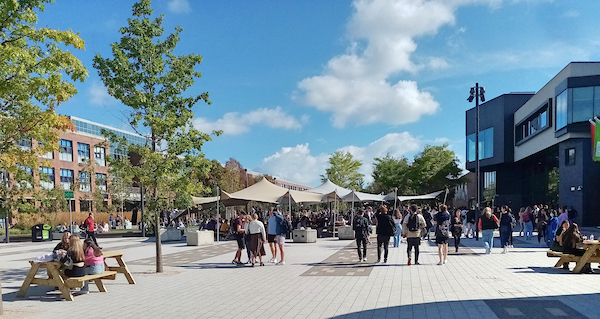

Since coming to Dublin, I’ve gotten quite close with a number of IFSA students who are studying abroad at University College Dublin with me, including Jacquie Kelley, from Vermont. Jacquie studies Political Science and Music at Providence College in Rhode Island, and lives with her three-year-old Golden Retriever, Moose. He’s a service dog, and helps her stand out of her wheelchair. Eventually, he will help her walk. Jacquie loves Netflix, playing the guitar, and singing, though not in front of people (she’s working on getting over that fear). I sat down with Jacquie to ask her a bit about her experience in Dublin so far.
What is your favorite part about studying abroad?
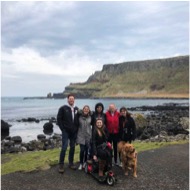
I love to travel. Even though I thought I would be able to travel outside the country, I have loved exploring Ireland. It’s is absolutely beautiful and I do not think I would be able to see its beauty if I just stayed in Dublin. I also have loved getting to know so many new people from all over. Most of my friends here are from the United States and they go to school all around the country. I do have some friends from Ireland and other parts of the world and I want to keep making more. I have never had a true friend group. At Providence College, I have lots of friends from lots of different circles and we are all so busy that it is hard to hang out. At UCD, I have a group of people who are my friends and we go everywhere together. Depending on the trip, there are 8-10 of us and I really enjoy it because it has given me a sense of belonging.
How accessible have you found Ireland to be?
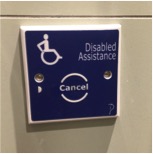
UCD is much more accessible than I was expecting. For one, we made a fire escape plan. I went to the Newman building where my classes are with a person from the access team. She showed me where the places of refuge were and where the accessible exits were. We only did this for my classes that were not on the ground floor because elevators do not work in the event of a fire or if the power goes out. This was the major difference for me. I have never done a fire escape plan before.
I have also noticed that the accessible symbol that is often used on the door of the bathroom is an individual in a wheelchair in motion. This is important because it signifies that people with disabilities are capable of being independent. I have been trying to get that symbol on the Providence College campus since I was a Freshman and I keep running into barriers. If Ireland can use the symbol then so can the United States. I was overjoyed when I saw it the first time I entered the bathroom.
Another thing I noticed was how well people react to service dogs. If someone wants to pet him, typically they ask for my permission and I have to tell them that he cannot be pet, which is very different from the U.S., where lots of people touch him without looking at the ‘do not pet’ tag on his vest. Once, I was on the bus in Ireland going to the store and a little girl wanted to pet my dog. Her mom pointed to the sign and told her that she could not pet the dog.
Could you tell me a little bit about your disability?
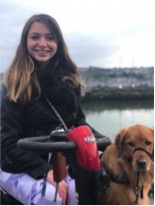
I have a form of Muscular Dystrophy called Spinal Muscular Atrophy type III. Basically, the muscles in my body are rapidly deteriorating. There is a treatment (not a cure), but it involves going to the hospital often and needing to stay in one place for a long period of time. It is administered into your spine with a needle. I have not done the treatment because I want to travel and explore the world; I do not want to be stuck in one place going in and out of the hospital. I have used a scooter since middle school and have used it full time since junior year of high school. In middle school, I was really embarrassed about my disability and simply wanted to fit in. I would exhaust myself walking up and down the halls all day because I refused to use my scooter. I did not become confident about my disability until junior year of high school and even then, I struggled with the idea of the future. Someday, I know I will be confined to a wheelchair; but right now I want to live in the moment and deal with the future when it comes.
What is one thing you wish more people knew/did/respected about your disability?
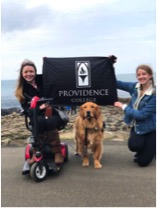
I wish that people saw me as diverse and I wish that people did not see my disability as something that holds me back, but rather as something that gives me strength. I am capable to doing much of the same things that able-bodied individuals can do and I do not want someone to tell me that I cannot do something because of my disability; I want them to tell me to do it and to prove to the world that I am no different than anyone else.
Julia W. | Psychology major | Purdue University | University College Dublin Partnership | Spring 2019 | IFSA International Correspondent